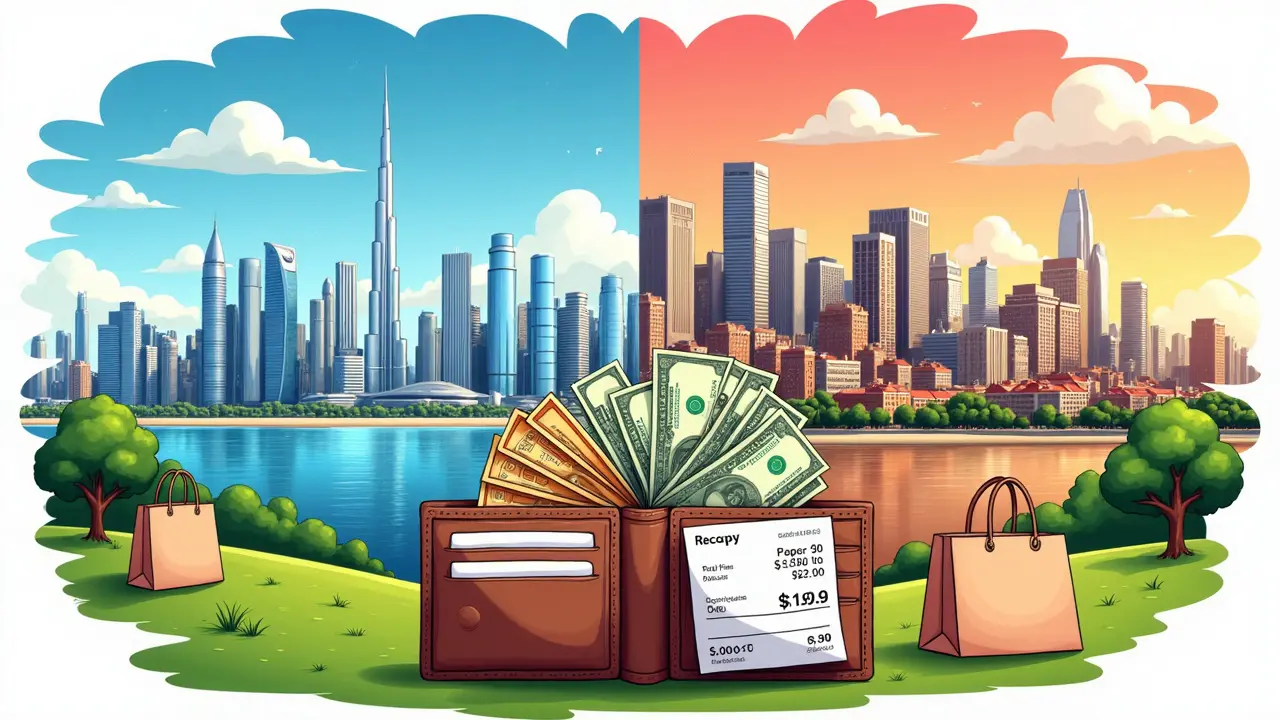If you’ve ever spent an afternoon lost on YouTube, you’ve probably seen those vlogs showing jaw-dropping Dubai skylines and mega malls. Palm trees, sports cars, gold-plated coffee—looks outrageously expensive, right? But then, try window shopping in Manhattan or paying for a two-bedroom apartment in San Francisco. If you want to know which place—Dubai or the USA—is actually cheaper to live in day by day, you’re not alone. Let’s get brutally honest about what “cheap” really means depending on what you earn, rent, eat, and do for fun—and throw in some local hacks to keep you ahead of the game.
Key Points: Quick Takeaways Before the Deep Dive
- Dubai’s zero income tax keeps more money in your pocket, but some goods and services hit harder.
- Rent in Dubai’s prime areas is often cheaper than NYC, LA, or San Francisco, but non-prime US cities get the edge.
- Groceries, utilities, and transportation all shift in affordability depending on the city, and lifestyle is a big player.
- Health insurance in the USA hurts your wallet more than in Dubai for most expats, unless it’s employer-paid.
- Saving money in Dubai is easier if you skip Western habits and embrace local deals—ditch Starbucks, grab local shawarma.
Direct Answer: Is It Cheaper to Live in Dubai or the USA?
Here’s the straight answer: It depends on your situation, but for many expats, cost of living Dubai vs USA tilts in Dubai’s favor if you’re earning a decent salary and don’t need to support a whole family with Western-school tuition fees. Dubai is especially cheaper for income taxes (zero for most), luxury rentals in prime locations, eating out at mid-range places, gasoline, and basic utilities. The USA is a winner if you’re living in low-cost states or suburbs, shopping at Walmart, and not aiming for hip city-center life. If you have children and want Western-quality private education, costs in Dubai can rocket past the US. Little things—like alcohol, pork, and imported groceries—cost more in Dubai, but flip the coin, and you’ll find savings at every turn if you adapt to the local scene. As always, your personal habits make or break your budget.
Diving into the True Cost: Rent, Groceries, and Everyday Life
Let’s put some real numbers on the board. In 2025, renting a one-bedroom apartment in Dubai’s downtown averages around AED 8,000/month ($2,180), which is still lower than Manhattan ($3,900/month) and barely above places like Austin, TX ($1,800/month). If you don’t need a Burj Khalifa view, you can find decent flats in Dubai’s Bur Dubai or Al Nahda for about $1,000/month. Studio apartments can get even cheaper. In contrast, if you’re living in midwest US cities like Kansas City or Memphis, rent can be as low as $700-900/month.
Utilities? Dubai’s infamous air-conditioning doesn’t come cheap: You might see $200-300/month in a small apartment, sometimes more in older buildings. Internet packages start at $80/month but tend to be fast and reliable. In the US, electricity and internet are usually cheaper if you pick the right state—think North Carolina, not California.
You’ll want to know about groceries. Dubai relies heavily on imports: milk, cheese, chicken, fruits—most are brought in. So, shopping like you did in the States will cost you about the same, maybe slightly more. A week’s supply of average groceries for one person costs $60-90 in Dubai, and not far off in big US cities. Want American peanut butter or a specific cereal? Expect to pay a hefty premium in Dubai. Here’s where things shift—go local with Emirati or Indian groceries at Carrefour or Union Coop, and watch your bill drop. In the US, Walmart and Costco are your best savings buddies.
For eating out, Dubai’s “shawarma economy” is unbeatable: grab a hearty meal from a street joint for $3-5. Fine dining splurges ($50-75 per person) are on par with the US. Alcohol is taxed hard in Dubai, so your post-work beer costs $10-12 at a bar, compared to $5-7 in New York.
Public transport in Dubai is squeaky clean and cheap: a monthly Metro pass for city travel is about $80. In New York, that’s $132. Gasoline, however, is shockingly cheap in Dubai—about $0.90/liter in 2025, which turns every road trip into a money-saving adventure, but Americans living in states like Texas will find car travel just as affordable.
What’s the Real Deal With Taxes and Insurance?
No taxes, no stress—right? In Dubai, most people pay zero income tax. If you’re an employee, your gross salary is what hits your account. No weird deductions, no April panic. You do pay a 5% VAT (tax) on most goods and services, added at checkout, but you barely notice compared to US state and federal taxes. The numbers speak for themselves: Someone making $80,000 in Dubai keeps it all (except what goes to rent and fun). In the US, that same worker sees about $60,000 after taxes if they’re living in New York, less if they’re in California, and a little more in states with no income tax like Florida or Texas.
Health insurance is the trickiest piece. In Dubai, if you’re employed, your health insurance is usually paid by your company. If you’re self-employed, plans start at about $800/year for basic coverage and run to $3,000/year for full-blown policies. US health insurance costs make even a grown man cry: employer-based family plans hit $24,000/year in 2024 (with workers kicking in $6,500+ on average), and if you’re buying solo, premiums are sky-high unless you’re eligible for subsidies.
If you have kids, schooling costs change the whole story. Dubai is packed with international and British-curriculum schools, but they’re brutally expensive: plan for $10-20K/year per child at a reputable institution. In the US, public schools are free, but private schools can be just as expensive as Dubai's international options.

Everyday Life, Culture, and Sneaky Costs That Catch Expats
Daily life in Dubai and the USA feels different from sunrise to sunset. Dubai’s cities don’t do “walkable neighborhoods” as well as Boston or Chicago. The heat means you’ll rely on taxis or Uber, which are more affordable than in the US—short city rides start around $4-5. But, many expats invest in their own car. Insurance on a Toyota Camry is about $1,200/year in Dubai, roughly the same in the USA (sometimes less, depending on state laws and your driving record).
Let’s talk fun. Dubai is famous for shopping and beach days. Most beaches are free or cheap to access ($5-10 for facilities). But nightlife can gouge your wallet: cocktails in Dubai’s trendiest bars run up to $20 a glass, not counting the ride home. Malls are everywhere, and outlet shopping offers deals year-round. Consumer electronics and clothing, however, often cost 10-20% more than US prices. In the US, you’ve got wild variety in entertainment—from free hiking trails to popular sports bars and affordable concerts in smaller cities.
Surprise fees lurk everywhere in both countries. In Dubai, landlords demand upfront deposits and one-year rent paid as a lump sum or in quarterly checks. US rentals may ask only a small deposit but keep monthly rent steady. Dubai's bank charges creep in for debit cards (around $30/year) and ATM withdrawals (if you use the wrong network). Banking fees in the US can be avoided more easily with the right choice of bank.
Local tips? In Dubai, never pay the “tourist price” for groceries or rent. Learn where residents shop: Union Coop, Lulu Hypermarket, Al Maya for bargains. For eating out, avoid chains, hit Indian cafeterias, and master the “entertainer app”—a discount app famous for getting you two-for-one deals on meals, spas, and more.
Cost of Living Table: Dubai vs USA (2025 Typical Monthly Expenses)
| Expense | Dubai (USD) | New York City (USD) | Phoenix, AZ (USD) |
|---|---|---|---|
| 1-bed Apartment (city center) | $2,180 | $3,900 | $1,750 |
| Utilities (elec, a/c, water) | $250 | $210 | $225 |
| Groceries (1 adult/month) | $300 | $400 | $340 |
| Public Transport Monthly | $80 | $132 | $64 |
| Internet | $87 | $63 | $52 |
| Meal for two (mid-range) | $75 | $100 | $65 |
| Monthly Health Insurance (single) | $100 (employer-paid or self-employed) | $550 (employer/ACA plan avg.) | $370 (employer/ACA plan avg.) |
| Car Fuel (per liter/gallon) | $0.90/liter | $1.16/liter ($4.40/gal) | $0.98/liter ($3.70/gal) |
Smart Tips for Saving and Adapting in Each Place
You don’t have to break the bank no matter where you go. In Dubai, join a community Facebook group before your move—they’re goldmines for secondhand furniture deals, events, and rental shares. Buy a Nol card for the Metro instead of Uber. Get used to government apps for bill payments; late fees add up fast. Don’t ignore the “entertainer” app for food, and find local brunches for the best fancy weekend feasts at flat prices. There’s a Friday “free food” culture in some expat churches and groups—worth checking out if you’re social and want to save.
In the US, get a Costco membership, cook at home, and check out local buy/sell/trade platforms (like Facebook Marketplace) for cheap furniture. For health insurance, use every employer benefit, and if self-employed, shop plans on government exchanges based on your exact income—your premium could be lower than you expect. Big tip: in the US, cash or “self-pay” deals at clinics sometimes cost less than your copay, so always ask.
If you’re moving family, consider education and afterschool costs as a make-or-break factor. Public school in the US is a steal compared to international schools in Dubai. Single and social? Both places have endless meetups, but Dubai does more group discount offers, while the US has happy hour specials—and plenty of free city events, especially in summer.
FAQ: Your Real Questions About Living Costs in Dubai vs USA
- Is Dubai cheaper than the USA for singles?—Yes, especially if you’re renting a small place, eating local, going light on alcohol, and embracing Dubai’s tax-free paychecks.
- What about for families?—That depends on education and housing needs. If you want international schooling, the USA may work out cheaper for families after you add up all the extras in Dubai.
- Can I save money faster in Dubai?—If your employer covers rent and school fees (common for top expat jobs), you’ll probably save much more in Dubai. If not, it’s a toss-up.
- Is public transport better in Dubai or the US?—Dubai Metro and trams are cleaner and newer, but fewer lines than big US cities. Most of America outside urban centers is still car-dependent, which adds up.
- Where are groceries cheaper?—Neither wins outright. US chains like Walmart edge out Dubai for processed foods, but Dubai offers lower bills if you stick to local and regional produce.
- What surprises most new arrivals?—In Dubai: swanky rents are sometimes cheaper than expected, but school fees and alcohol sticker-shock everyone. In the US: taxes and insurance kill budgets for many moving from low-tax countries.
Want the best tip? Before booking that flight, make a personal budget with your real salary, family size, and lifestyle choices. Test it with local expats and tweak until it feels right. Each city hides little treasures—and expensive traps—so do your homework, adapt quickly, and you’ll keep way more cash for those legendary Dubai weekends or that epic American road trip.






